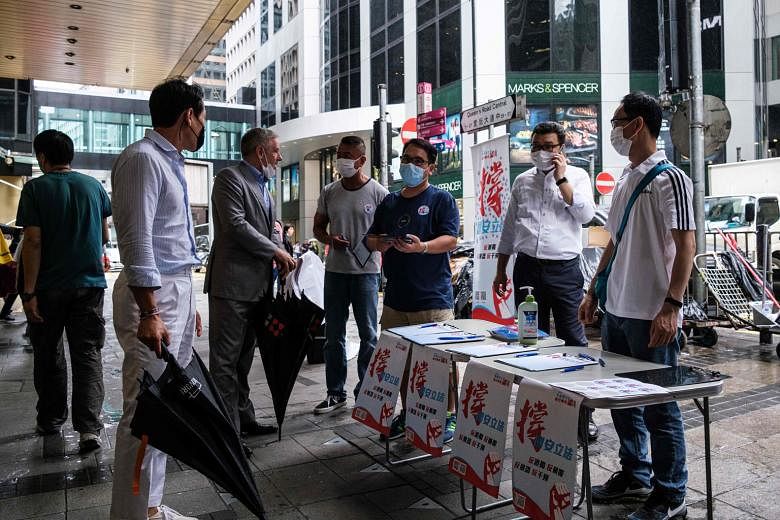HONG KONG• • The Hong Kong government told the United States to keep out of the debate over national security legislation being imposed by China, and warned that withdrawal of the financial hub's special status under US law could backfire on America's economy.
Hong Kong has been racked by protests amid fears that Beijing is curbing the high degree of autonomy it has enjoyed under a "one country, two systems" formula adopted when it returned from British to Chinese rule in 1997.
"Any sanctions are a double-edged sword that will not only harm the interests of Hong Kong, but also significantly those of the US," Hong Kong's pro-Beijing government said late on Thursday.
From 2009 to 2018, the US trade surplus of US$297 billion (S$420 billion) with Hong Kong was the biggest among all of Washington's trading partners, and 1,300 US firms were based in the city, it said.
Beijing says the new legislation, likely to come into force before September, will tackle secession, subversion, terrorism and foreign interference in the city. It could also see Chinese intelligence agencies set up bases in Hong Kong.
Underscoring the risk for foreign businesses of becoming caught in the political crossfire, former Hong Kong leader Leung Chun Ying criticised banking group HSBC Holdings for not making its "stance" clear on China's imposition of the new law.
"One week has passed, HSBC still hasn't expressed their stance on the national security legislation," Mr Leung, Hong Kong's Chief Executive from 2012 to 2017, wrote in a Facebook post. "(The) UK government is following the US government; whether or not HSBC will follow UK govt is something we need to be highly concerned about," he wrote.
Mr Leung, a vice-chairman of the Chinese People's Political Consultative Conference - China's top political advisory body - said HSBC should not do things that hurt "China's sovereignty, dignity and people's feelings", while making money in that country.
An overwhelming majority of Hong Kong residents said they oppose the new security legislation.
Results released yesterday showed that 96 per cent of 9,477 pro-democracy supporters polled in the semi-autonomous city opposed the law, according to a survey released by the Hong Kong Public Opinion Programme.
Of 1,186 respondents identifying themselves as supporters of the government, only 29 per cent rejected the legislation while 62 per cent supported it, the survey said.
The results came on the same day Hong Kong Chief Executive Carrie Lam issued a letter to the city's people, asking them to support the legislation.
The law "will only target an extremely small minority of illegal and criminal acts and activities, while the life and property, basic rights and freedoms of the overwhelming majority of citizens will be protected", Mrs Lam wrote in an open letter posted to the Hong Kong government website yesterday.
She asserted that residents would continue to enjoy freedoms of speech, the press, assembly and demonstration.
"Hong Kong has become a gaping hole in national security, and our city's prosperity and stability are at risk," she wrote, saying she saw outside influences at play.
"External forces have intensified their interference in Hong Kong's internal affairs, passed laws relating to Hong Kong and flagrantly glorified the illegal acts of radicals, all of which seriously jeopardise our nation's sovereignty, security and development interests," she said.
REUTERS, BLOOMBERG

